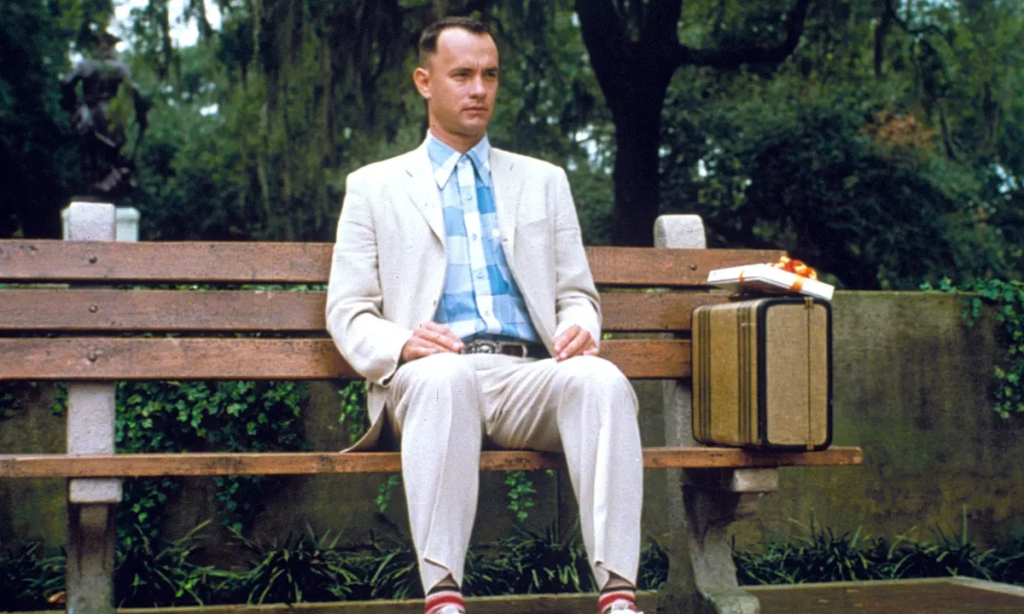
Director: Robert Zemeckis
Writers: Winston Groom, Eric Roth
Stars: Tom Hanks, Gary Sinise, Robin Wright
Synopsis: The history of the United States from the 1950s to the ’70s unfolds from the perspective of an Alabama man with an IQ of 75, who yearns to be reunited with his childhood sweetheart.
In 1994, the Summer blockbuster Forrest Gump not only finished as the second-highest-grossing film of that year – only behind Disney’s The Lion King – but it also won six of its 13 Oscar nominations, including Lead Actor (Tom Hanks), Director (Robert Zemeckis), and the Academy’s biggest prize, Best Picture. Beloved by audiences and enjoyed by critics, Forrest Gump has remained, for 30 years, one of the most well-known films in history, including some of the most notable characters and stories cinema has ever seen. However, there is a massive issue with not only the film itself and its lengths to be apolitical but also the memory and high praise it still manages to receive today, highlighting the most glaring problem: the sheer reliance on nostalgia.

The film takes place throughout Forrest Gump’s (Hanks) life, from his childhood to the present day of the film, somewhere in the mid-1980s. The film opens with Forrest sitting on a park bench waiting for the bus. As bystanders sit on the bench with him, he talks and tells his unbelievable life story. As one person leaves, another sits to hear how this man went from having braces on his legs restricting his ability to walk to ultimately becoming involved in almost every major American event during the ‘60s and ‘70s, including Vietnam, Watergate, Apple, the Bear Bryant Dynasty at the University of Alabama, and providing inspiration for John Lennon’s “Imagine” and Elvis Presley’s iconic dance, among many others.
The nostalgia, as mentioned earlier, makes this film a hard one to critique because today, maybe even more so than in 1994, there is a love and following for this movie that is unwavering. The people who like it LOVE it, while those who don’t, fail to get the appeal. There is nostalgia with the movie itself that reminds people of their childhood, witnessing this film and hearing the never-ending number of quotes for the first time, and for that, I do have to tip my hat to Robert Zemeckis. However, the reality is that Forrest Gump is much like an unseasoned and overcooked steak loaded with enough sauce to fool people into believing they just had a high-quality meal.
Zemeckis struck lightning with what will always be his Opus with Back to the Future and then followed this massive breakout with Who Framed Roger Rabbit?, another fantastic film that blended animation and reality in a way that only Disney had been able to pull off previously. Both films had a sense of wonder and enjoyment; they could tell a good and exciting story without the audience digging too deep into the subtext. The filmmaking might have been pedestrian, but the story and excitement made up for it in the long run. When it comes to Forrest Gump, that sense of joy is lost in a sea of remembrance. There is no style to how Zemeckis shoots this film. Too many scenes are drawn out and dull, and when he attempts to get gritty in situations that could use it, it remains too pristine. I have to be honest; there is enjoyment in viewing certain recreations of historical events with Hanks’ Forrest included in these moments. However, the point practically stops there as these moments become exciting things to look at but nothing to digest. Certain historical circumstances, such as Vietnam and the treatment of veterans both by the government and by the civilians, are overlooked in such a way that leads you to believe you’re watching something that is supposed to skew that history for the masses. Rather than providing any genuine substance to the film, Zemeckis plays it as safely as possible, which might’ve been the correct answer in the short run. Still, it is unbelievable that in a life as overtly political as the fictional Forrest Gump is, the film manages to be as apolitical as possible.

There is a safeness here that Zemeckis and screenwriter Eric Roth, who I will not blame too much given that this was based on an already established novel, exploit. The audience is lured into this unbelievable life, witnessing all of these extraordinary events, but they aren’t able to ask any questions. The themes that were apparent in the novel didn’t have to be altered too far to make this a much more honest film, but again, the film protected the audience from any of the real darkness that America had seen over the past 30 years. The screenplay was designed to highlight the good and make the bad seem not so bad, such as showing that they had unlimited ice cream and ping pong at the VA hospital when it was already made apparent in the real world how poorly the veterans had it after war injuries. There also were outbursts of political disgust, but they were delivered by characters who had already raised moral questions, such as Jenny’s boyfriend, who hit her. But he did so because he hates the war and the “lying son of a bitch, Johnson.” It’s a script that finds a way to manipulate the audience into believing that the previous 30 years might’ve had some rough patches, but everyone is okay in the end.
The performances in this film were also manipulative and problematic as well. Robin Wright as Jenny is a full-on horror show. She endures every stereotype of the ‘60s through the ‘70s, including wannabe folk singer, showgirl, freedom fighter, hippie, drug abuser, and genuinely any other character trait that could be found during this time. I’ll give Wright the grace of having to try to pull off so many different personalities, but her character changed so much, and she had no motivation or goals, so it felt like Wright was constantly having to play catch-up. Tom Hanks as Forrest was also hit or miss in terms of performance. Luckily for Hanks, he never went too far down the path of being problematic as he portrayed a character with a mental disability. Still, for the most part, all he had to do was have his character fall into these certain situations with little reaction. It isn’t until the film’s third act that Hanks has a chance to act. When he does, his performance and Alan Silvestri’s magnificent score (one of the sole constant positives throughout the film) become some of the film’s emotional highlights, but you have to get through 2 hours before this comes. It’s a decent performance with a few highs, but it doesn’t rank anywhere near the top of Hanks’ long list.
The film’s best performance comes from Gary Sinise’s Lieutenant Dan. Lt. Dan is the film’s only character with an actual arc. While he isn’t the main character and only shows up in spurts throughout the film, watching Sinise go through the difficulties of learning the purpose he believed his life had and that this wasn’t how his life was supposed to go was heartbreaking. You see Lt. Dan at his absolute lowest and are with him as he rediscovers himself and has a new meaning for life. There could have been a version of this film that focused on Forrest and Lt. Dan in a post-Vietnam landscape that would have been touching. The friendship between the two and their care for one another is the only palpable relationship in the film. While the third act might have been Hanks’s most emotional of the film, it is in these moments with Lt. Dan that he is at his most natural, thanks mainly to Sinise’s brilliant performance.

People love Forrest Gump and have loved it for 30 years and will continue to love it for the next 30 years and beyond. However, 30 years after its release, it is time for more people to be open about the issues and potential dangers of the film. When you push the nostalgia aside, you are left with an apolitical look at some of America’s most politically charged times. The direction could be more varied, and the performances rarely have time to shine. I will always understand why people like this movie, but I don’t think I ever will.

